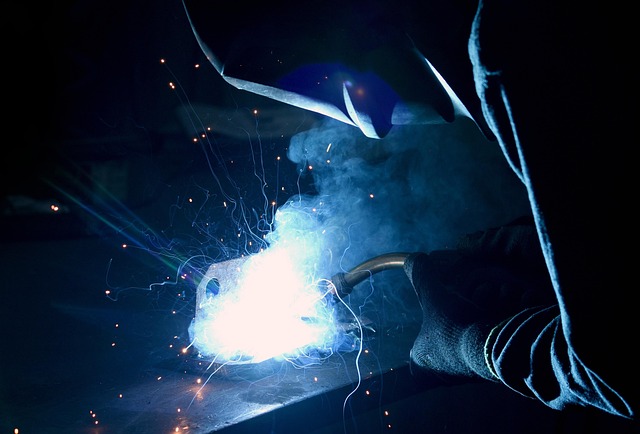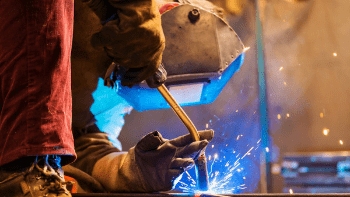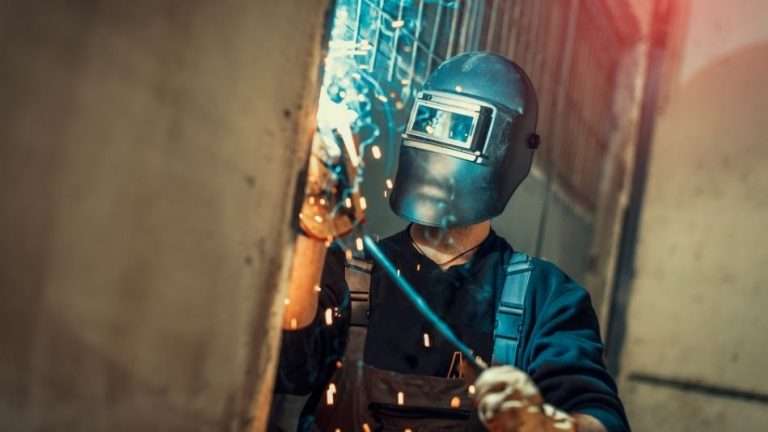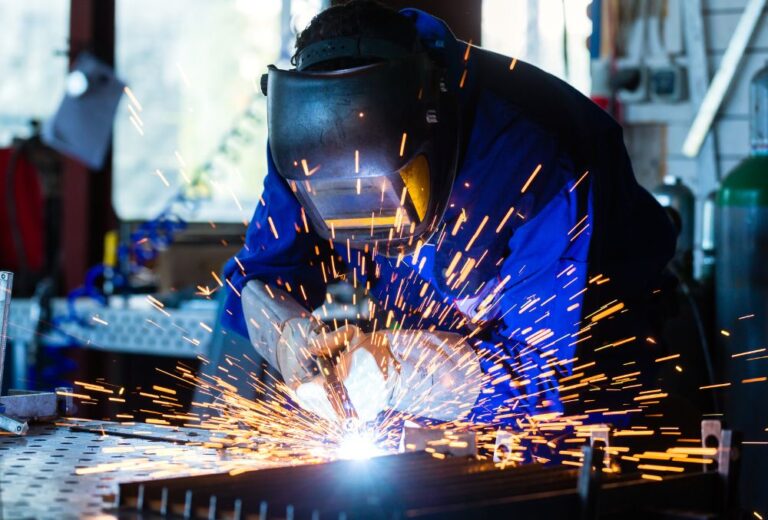Is Welding a Good Career? 10 Reasons You Should or Should Not be a Welder
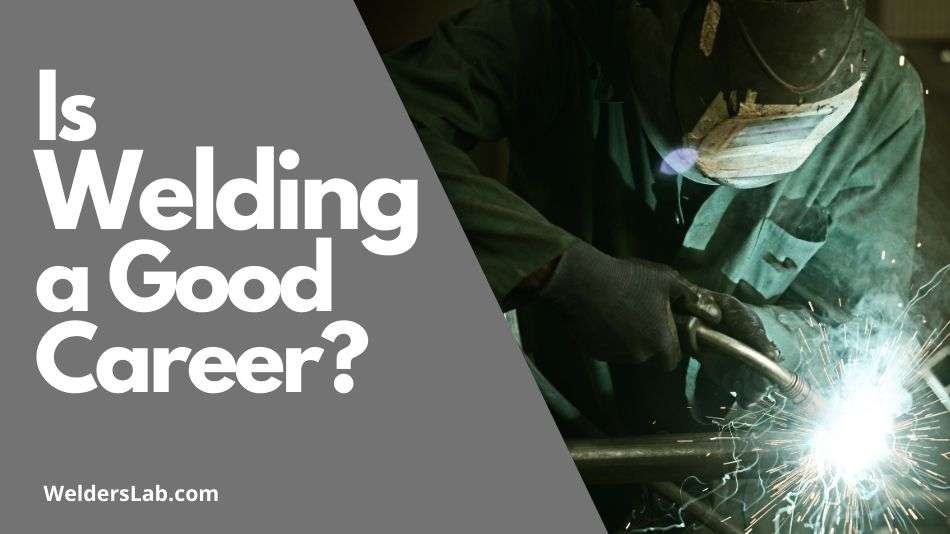
Whether you’re just entering the workforce and settling on a career or you’re looking to possibly change careers, there are a lot of paths you can consider. I joined the welding industry because I felt as though I had something to offer. I had some knowledge of the field and I felt like I had the skills and the talent to hone those skills.
Choosing a career path can be overwhelming. There are a lot of things to consider. You might need to consider the possible pay, the work environment, the hazards, the travel, or even the training requirements. Welding is a versatile career. Welders work in a ton of different capacities but overall it’s the same concept across the board.
Is welding a good career? Welding jobs are expected to grow by 3% between now and 2029, the median pay for is $20.43 an hour or $42,490 annually. There are currently 438,900 jobs in the welding market and best of all you can start most jobs with a high school diploma or the equivalent.
To help you out I’ve put together a quick guide to share with you 5 reasons you should be a welder and 5 reasons you should not be a welder. My hope is that this will be an intuitive guide that will offer you valuable concepts to consider as you plan your own career path.
Is Welding a Good Career? An Intuitive Guide to Answering Your Questions
It’s only fair that we review both sides of the coin as we discuss whether or not welding is a good career. After all, we all have different personalities and we may have different goals that we are aspiring for as well.
5 Reasons You Should be a Welder
In terms of is welding a good career choice, I think these 5 topics point towards the positive side of why you should be a welder.
- New welders are always needed
- Welding pays well
- Most of the time, you can start right out of high school
- You’re continually learning new skills
- There are a variety of welding jobs available
Now, let’s dig a bit deeper into each of these for you.
1. Welders are in High Demand
The welding market is continuously growing. While some markets tend to decline and then rise in a circular pattern of expansion and contraction, welding primarily continues to grow. Welders are always needed – no matter the climate or the economic environment.
This means that when other industries are laying people off, welders can typically rest assured that they are needed somewhere. If for some reason you work for a business that lays you off, as a welder, it will be fairly easy for you to find another home to share your welding skills.
While the current projected growth rate is lower than it has been in the past, the key is that the industry is still growing. This is a steady industry that has shown continual growth with an anticipated growth rate over the next 10 years.
2. Well-Paying Job
The welding career pays fairly well, no matter which industry you work in. You can work in multiple different types of industries – from aerospace welding to pipeline welding to construction welding and more.
According to the U.S. Bureau of Labor Statistics, welders average about $20.43 per hour or $42,490 per year. You can check out my article on aerospace welding to see that some industries far surpass this amount. In fact, pipeline welders can get into 6 digits for annual pay.
The same information that gives us the median tells us that more than 10% of welders earned $64,240 annually in 2019 or more. These are pretty good odds.
What you should know here is that sometimes you have to work your way up and build your skills to reach higher-paying levels.
3. No Degree Required
While some welding industries do require specific certifications in order to work in the field, there are many that will start you right out of high school. If you know you’re interested in the field, there are technical high schools that work you through a program as well.
If you want or need a certification or degree, there are certificate programs that take 1-2 years to complete and you work your way through them. Many employers will hire you and then put you through the program.
Some industries require specialized training and certification so just keep that in mind. Overall, though, many welders are able to break into the welding industry shortly after high school and then build from there.
4. You Never Stop Learning
Listen, in the welding industry, you’re not going to get bored. Your day to day work is going to vary as is the type of job that you do.
You will continuously be working and building your skills, no matter which industry you work in. In fact, the best welders make it a habit to build their skills and hone them to perfection.
Additionally, there are constantly new techniques making their debuts on a regular basis. You should strive to continue to build your knowledge and your skills continually.
As a welder, you might be welding, cutting, soldering, brazing, or some other welding-related duty. You could be working outside or you could be working in a factory setting. You could be working with basic steel or you might be working with aluminum.
Each of these requires varying knowledge and varying skills and expertise in order to be successful.
5. The Welding Industry Varies
There are a variety of welding jobs available out there. I’ve touched on this a little but you can weld in many different capacities. I’m not just referring to cutting, soldering, brazing, and welding here; I’m talking more about the various industries and the various types of welding.
You can MIG, TIG, stick, plasma, or gas weld. There are several options beyond these also. Then there are the different industries that use welding. Here are a few.
- Pipeline
- Aerospace
- Shipyards
- Military
- Manufacturing
- Construction
- Automotive
- Railroad
These are just some of the most common welding industries but it really is a broad category and there are a lot of different industries and job types that use welders in some way. Your welding skills might be put to use in maintenance capacities.
Just know, there are options. Welding is not just “welding”, it is far more than that. One more thing here, you can potentially switch between industries if you decide that a different industry would be more suited to your goals.
Welding skills are transferrable between different industries. There may be some new things for you to learn and new certification to acquire but the welding knowledge you have will go with you from job to job.
5 Reasons You Should Not be a Welder
In terms of the question, is welding a bad career, well some people might think so. Again, your answer to this is going to depend on a number of factors.
In an effort to be open-minded, here are 5 reasons that welding might be considered a bad career choice.
- Slower than normal growth rate in welding
- Welding jobs replaced by robots
- Certifications may be required for higher-paying jobs
- There can be a health risk
- Welding can be a stressful job
1. Slow as a Turtle
You saw me mention earlier that the industry has proven growth over the years and shows projected growth.
Here is the flip side of the growth scenario. While there is still projected growth, that projected growth rate is only anticipated to be about 3% over the next decade (2018-2028). What this information doesn’t truly show is that some parts of the industry are expected to grow more while some are expected to decline.
The 3% growth rate projected is considered slower than most industries where growth is concerned. According to the U.S. Bureau of Labor Statistics, the U.S. employed 424,700 welders in 2018. These are jobs and workers that are specifically classified as welders.
This is a much slower growth rate than what we would like to see, especially considering the astronomical growth that the industry has seen in the past. This could be cause for concern that some welding jobs are on their way out or are no longer necessary.
2. Robots are Taking Over
We’ve heard this line before and you will probably keep hearing it. As technology continues to progress, numerous things no longer need humans. Some welding jobs are included in this.
Some welding jobs have been replaced by robotics and some welding jobs are continuing to be replaced by welding jobs. I assume it’s safe to say that this isn’t going to stop. There will always be technological advancements and those advancements will always be put to use.
I’m going to play devil’s advocate here and give you another spin on the robot thing. Yes, there are robots that are taking over some welding jobs. Most of the welding jobs that robots are being used for are some of the lower-level welding jobs.
When it comes to precision and expertise and challenging welds, a robot cannot replace a person. While a robot can certainly be precise, its talents are limited. It can only work within specific parameters and specific working environments.
While robotics can replace some welding needs they cannot eradicate the welding industry completely. There will continue to always be a need for welders, although those needs may change. Additionally, someone has to program the robots and check their work and set them up – most likely someone with welding knowledge.
Before I get off of my soapbox here, let me talk about another aspect that takes robots into consideration. Robots are expensive to purchase and maintain. Some industries and businesses can afford them while others cannot even consider it.
It is awful that some welding jobs are being lost to robots that can weld but don’t let this factor alone make your decision. There’s certainly more to this story.
3. Higher Education May Be Required
You can break into a welding career right out of high school. There is limited technical training required to get a welding job.
However, that doesn’t mean you will get a high-paying or even an average welding position. These are the jobs that will be on the low-end of the spectrum. Which is fine, it’s a good starting place.
If you’re interested in a higher-paying welding job or even in a specific industry, certification and additional education may be required in order to ever get there. For instance, the aerospace industry almost always requires specific aerospace certification.
This varies by industry and position but just know that many of the higher-paying jobs require training, certification, or maybe even just experience. Don’t be afraid to start at the beginning and work your way to a higher place.
Everyone has to start somewhere.
4. Welding Poses a Health Risk
This is perhaps the biggest reason to consider as a negative aspect. There are certain health risks that come with welding. Of course, some of these health risks can be mediated by wearing appropriate personal protective equipment.
If you follow the guidelines for PPE, you are far more likely to be protected appropriately. However, the risk remains. The thing is, there are multiple risks.
For one, you could find yourself facing burns. After all, you’re working with sparks and heat and fire and those things can jump where you don’t want them. It is perhaps inevitable that you will face a burn at some point in your welding career.
Again, appropriate PPE is the best way to mitigate this risk.
Next, you risk damage to your eyes. A welding helmet is required and necessary to protect your eyes. Here’s the thing, many welders have gone to using auto-darkening helmets and the fact of the matter is that they don’t always adjust quickly enough.
Even with manual welding helmets, if you don’t get the right shield in your eyes could be subjected to those sparks and you might experience eye burn. This is both dangerous and uncomfortable. Typically, you will recover but it could cause permanent damage.
And finally, the biggest risk and the hardest risk to mitigate is the inhalation of welding fumes. There are very few metals that you can weld without wearing a mask or a respirator. There are some fumes that a mask is considered protection enough.
Then, there are metals that you absolutely should never weld without wearing a respirator. These fumes are highly toxic to our bodies. You may not notice immediate damage but subjecting yourself to these fumes will leave a lasting effect – including lung disease, black lung, and lung cancer possibilities.
5. The Stress is Real
This is another hearty aspect of the reality of a welding career. The job is stressful and it can be back-breaking work.
You have a big responsibility on your shoulders as a welder. First, you have to be able to complete a quality weld. You can’t just skirt the processes and expect to be successful. You have a responsibility to produce a certain quality. There are welding standards you have to keep up with and meet.
If you’re working with anything load-bearing or structural, you have the responsibility of making sure that your welding job is sound and is going to stand up to the test. It’s easy to make mistakes and welding takes a lot of focus and concentration.
There are constantly new techniques to learn and you should be learning and honing your skills on a routine basis.
The stress in welding boils back down to whether you feel confident in your skills and abilities and whether you’re willing to put the focus that welding requires to the job.
Conclusion
Is welding a good career?
This is a multi-faceted question that has a lot of variables. It’s a good career for most people who are interested in it if they are willing to put in the work. It takes time to build a career. It takes effort and endurance to be successful.
There is no promise of success and many people get into the industry only to decide it isn’t really for them. It’s NOT for everyone. It CAN be a good career but it’s certainly not a good career for everyone. Consider all of the details and whether you’re willing to work hard to better yourself and build your skills.
I’ve found my place with welding and it’s quite possible that you could too. I hope that you find my points here to be valuable in answering your questions and weighing the pros and cons of whether or not welding may be a good career for you or not.
Weigh your options, do the research, and understand your own capabilities and personality to determine if welding is right for you. Understand that there are many aspects of the job – some are good and some are not so good.
If you’re considering a welding career, I hope this guide helps you make an intuitive and informed decision for you to proceed. Happy welding!

